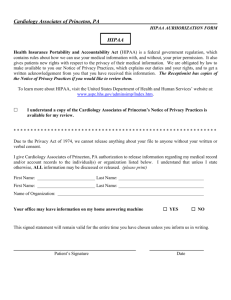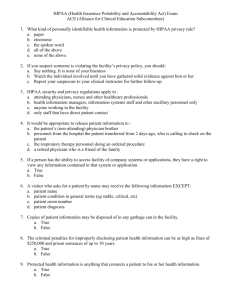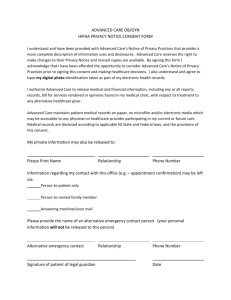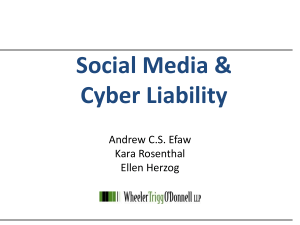Arkansas Office of Information Technology
advertisement
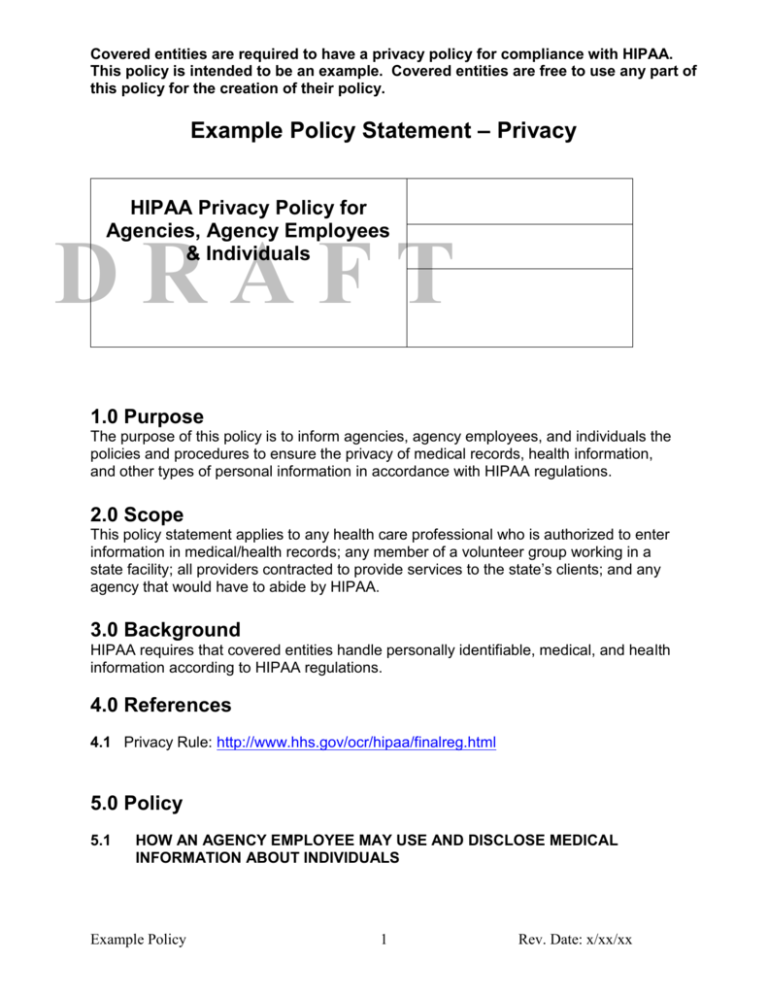
Covered entities are required to have a privacy policy for compliance with HIPAA. This policy is intended to be an example. Covered entities are free to use any part of this policy for the creation of their policy. Example Policy Statement – Privacy HIPAA Privacy Policy for Agencies, Agency Employees & Individuals DRAFT 1.0 Purpose The purpose of this policy is to inform agencies, agency employees, and individuals the policies and procedures to ensure the privacy of medical records, health information, and other types of personal information in accordance with HIPAA regulations. 2.0 Scope This policy statement applies to any health care professional who is authorized to enter information in medical/health records; any member of a volunteer group working in a state facility; all providers contracted to provide services to the state’s clients; and any agency that would have to abide by HIPAA. 3.0 Background HIPAA requires that covered entities handle personally identifiable, medical, and health information according to HIPAA regulations. 4.0 References 4.1 Privacy Rule: http://www.hhs.gov/ocr/hipaa/finalreg.html 5.0 Policy 5.1 HOW AN AGENCY EMPLOYEE MAY USE AND DISCLOSE MEDICAL INFORMATION ABOUT INDIVIDUALS Example Policy 1 Rev. Date: x/xx/xx The following categories describe different ways that agencies may use and disclose medical/health information. Explanation and examples are given for each category of uses or disclosures. Not every use or disclosure in a category will be listed. However, all of the ways agencies are permitted to use and disclose information will fall within one of the categories. Agencies can use or disclose medical information about an individual regarding his/her treatment, payment for services and for agency operations. 5.1.1 Treatment: Caregivers, such as nurses, doctors, therapists, nutritionists and social workers may use an individual’s health information to determine current plan of care. Employees and programs within the Agency may share health information about an individual in order to coordinate the services he/she may need, such as clinical examinations, therapy, nutritional services, medications, hospitalization or follow-up care. Agencies may also use an individual’s health information to determine if his/her treatment is medically necessary or to ensure that proper treatment is being given. 5.1.2 For Payment: The Agency may release information about an individual to Medicaid, his/her health plan or health insurance carrier to obtain payment for our services. For example, an Agency may need to give an individual’s health plan information about a clinical exam or vaccinations that the individual or his/her child received so his/her health plan will pay the agency or reimburse the individual for treatment or services provided. Agencies may also share an individual’s information, when appropriate, with other government programs such as Workers’ Compensation, Medicaid, Medicare in order to coordinate his/her benefits and payments. Agencies may also tell an individual’s health plan about a treatment he/she is going to receive in order to obtain prior approval or to determine whether his/her plan will cover the treatment. 5.1.3 For Operations: The Agency may use and release information about an individual to ensure that the services and benefits provided to him/her are appropriate and are high quality. For example, an Agency may use an individual’s information to evaluate the agency’s treatment and service programs or to evaluate the services of other providers that use government funds to provide health care services to the individual. Agencies may combine health information about many individuals to research health trends, to determine what services and programs should be offered, or whether new treatments or services are useful. Agencies may share an individual’s health information with business partners who perform functions on behalf of the Agency. For example, an Agency’s business partners may use an individual’s information to perform case management, coordination of care or other assessment activities. The Agency requires that its business partners abide by the same level of confidentiality and security as its employees when handling an individual’s health information. Example Policy 2 Rev. Date: x/xx/xx 5.1.4 To Other Government Agencies Providing Benefits or Services: Agencies may release an individual’s health information to other government agencies that are providing an individual with benefits or services when the information is necessary for him/her to receive those benefits and services. 5.1.5 To Keep An Individual Informed: The Agency may contact an individual about reminders for treatment, medical care or health check-ups. The Agency may also contact an individual to tell him/her about health related benefits or services that may be of interest to him/her or to give the individual information about his/her managed care choices. 5.1.6 For Public Health: The Agency may release an individual’s health information to other divisions within the Agency as it relates to public health, subject to the provisions of applicable state and federal law, for the following kinds of activities: 5.1.6.1 5.1.6.2 5.1.6.3 To prevent or control disease, injury or disability or to keep vital statistics records such as births and deaths; To notify social service agencies that are authorized by law to receive reports of abuse, neglect or domestic violence; To report reactions to medications or problems with products to the Food and Drug Administration (FDA). 5.1.7 For Health Oversight Activities: The Agency may share an individual’s health information with other divisions within the agency and with other agencies for oversight activities as required by law. Examples of these oversight activities include audits, inspections, investigations and licensure. 5.1.8 For Law Enforcement: The Agency may release health information to a law enforcement official, subject to applicable federal and state law and regulations, for purposes that are required by law or in response to a court order or subpoena. 5.1.9 For Research: The Agency may release an individual’s health information for research projects that have been reviewed and approved by an institutional review board or privacy board to ensure the continued privacy and protection of the health information. 5.1.10 Lawsuits and Disputes: If an individual is involved in a lawsuit or a dispute, the Agency may release health information about him/her in response to a court or administrative order. The Agency may also release health information about an individual in response to a subpoena, discovery request, or other lawful process by someone else involved in the dispute, but only if efforts have been made to tell the individual about the request or to obtain an order protecting the information requested. Example Policy 3 Rev. Date: x/xx/xx 5.1.11 To Coroners, Medical Examiners and Funeral Directors: The Agency may release health information to a coroner, medical examiner or funeral director, as necessary to carry out duties as authorized by law. 5.1.12 For Organ Donations: If an individual is an organ donor, the Agency may release his/her health information to an organization that procures, banks, for transports organs for the purpose of an organ, eye or tissue donation and transplantation. 5.1.13 To Avert A Serious Threat to Health or Safety: The Agency may release an individuals health information if it is necessary to prevent a serious threat to his/her health and safety or to the health and safety of the public or another person. 5.1.14 For National Security and Protection of the President: The Agency may release an individual’s health information to an authorized federal official or other authorized persons for purposes of national security, for providing protection to the President, or to conduct special investigations, as authorized by law. 5.1.15 To a Correctional Institution: If an individual is an inmate of a correctional institution or under the custody of a law enforcement officer, the Agency may release his/her health information to the correctional institution or law enforcement officer. The information released must be necessary for the institution to provide an individual with health care, protect his/her health and safety or the health and safety of others, or for the safety and security of the correctional institution. 5.1.16 To the Military: If an individual is a veteran or a current member of the armed forces, the Agency may release his/her health information as required by military command or veteran administration authorities. 5.2 If an individual does not object and the situation is not an emergency and disclosure is not otherwise prohibited by stricter laws, the Agency is permitted to release his/her information under the following circumstances: 5.2.1 To Identified Individuals Involved In An Individual’s Care: The Agency may release an individual’s health information to a family member, other relative, friend or other person whom the individual has identified to be involved in his/her health care or the payment of his/her health care. 5.2.2 To Family: The Agency may use an individual’s information to notify a family member, a personal representative or a person responsible for his/her care, of his/her location, general condition or death. Example Policy 4 Rev. Date: x/xx/xx 5.2.3 To Disaster Relief Agencies: The Agency may release an individual’s health information to an agency authorized by law to assist in disaster relief efforts. 5.3 THE AGENCY’S REQUIREMENTS The Agency is required by state and federal law to maintain the privacy of an individual’s health information. Agencies are required to give an individual this notice of its legal duties and privacy practices with respect to the health information that the Agency collects and maintains about the individual. Agencies are required to follow the terms of this notice. This notice describes and gives some examples of the permitted ways that an individual’s health information may be used or released. Release of an individual’s information outside of the boundaries of Agency-related treatment, payment or operations, or as otherwise permitted by State or Federal law, will be made only with an individual’s specific written authorization. An individual may revoke specific authorizations to release his/her information, in writing, at any time. If an individual revokes an authorization, the agency will no longer release the individual’s health information to the authorized recipient(s), except to the extent that the Agency has already used or released that information in reliance of the original authorization. 6.0 Procedures 6.1 INDIVIDUALS’ HEALTH INFORMATION RIGHTS Individuals have the following rights regarding the health information that the Agency has about him/her: 6.1.1 Right to Inspect and Copy: Individuals have the right to inspect and obtain a copy of their health information. This request may include medical, billing or health care payment information. It does not include information that is needed for civil, criminal or administrative actions or proceedings or psychotherapy notes. Agencies may charge a fee for the costs of copying, mailing or other supplies associated with an individual’s request. 6.1.2 Right to Request Amendment: If an individual feels that the health information the Agency has created about him/her is incorrect or incomplete, he/she may ask us to amend that information. The Agency may deny the request if an individual asks to amend information that: 1) was not created by the Agency; 2) is not part of the health information kept by the Agency; 3) is not part of the information which the individual would be permitted to inspect or copy; or 4) the information is determined to be accurate and complete. Example Policy 5 Rev. Date: x/xx/xx 6.1.3 Right to Accounting of Health Information Releases: Individuals have the right to request a list of information releases that the Agency has made of their health information. The list will not include: 1) health information releases made for purposes of providing treatment to an individual, obtaining payment for services or releases made for administrative or operational purposes; 2) health information releases made for national security; 3) health information releases made to correctional institutions and other law enforcement custodial situations; 4) health information releases the Agency has made based on an individual’s written authorization; 5) health information releases to persons who are involved in an individual’s care; or 6) health information releases made prior to April 16, 2003. 6.1.4 Right to Request Restrictions: Individuals have the right to request a restriction or limitation of the health care information the Agency uses or releases for treatment, payment or operational purposes. The Agency is not legally required to agree the requested restriction or limitation. 6.1.5 Right to Request Confidential Communication: Individuals have the right to request that Agencies communicate with them about health care matters in a certain way or at a certain location. For example, an individual can request that the Agency only contact him/her at work or by email. The Agency will accommodate all reasonable requests. To request confidential communications, an individual must specify how or where he/she wishes to be contacted. 6.1.6 Right to a Paper Copy of this Notice: Individuals have the right to request a paper copy of this notice from this Agency at any time. 6.1.7 All requests for inspecting, copying, amending, making restrictions, or obtaining an accounting of an individual’s health information must be made in writing to: (agency contact information) 6.2 COMPLAINTS If an individual believes his/her privacy rights have been violated, To file a complaint to the (Agency name), contact: (Agency contact information) An individual may file a complaint with the Arkansas HIPAA contact: Office of the Executive CIO; 124 West Capitol, Suite 200; Little Rock, AR 72201; 501-682-4301. An individual may file a complaint with the facility or with the Secretary of the Department of Health and Human Services. You may call them at 877-696-6775 or write to them at 200 Independence Ave. S.W., Washington, DC, 2020l. An individual may file a grievance with the Office of Civil Rights by calling 866OCR-PRIV (866-627-7748), or 886-788-4989 TTY. Example Policy 6 Rev. Date: x/xx/xx 6.3 CHANGES TO THIS POLICY The Agency reserves the right to revise this policy. The Agency reserve the right to make the revised policy effective for the health information it already has about an individual, as well as any information it creates or receives in the future. The Agency will provide individuals with a copy of the revised policy within 60 days. The Agency will post a copy of the current policy at its website. In addition, an individual may ask for a copy of his/her Agency’s current policy regarding privacy practices anytime an individual visit to an Agency facility for treatment or health care services. 7.0 Revision History Date XX/XX/2002 Description of Change Original Policy Statement Published 8.0 Definitions 8.1 Covered Entity: health plans, health care clearinghouses, and health care providers who transmit any health information in electronic form in connection with a standard transaction 8.2 Health Care Provider: a provider of medical or health services and any other person or organization who furnishes, bills, or is paid for health care services or supplies in the normal course of business 8.3 Health Information: any information, whether oral or recorded in any form or medium, that: (1) Is created or received by a health care provider, health plan, public health authority, employer, life insurer, school or university, or health care clearinghouse; and (2) Relates to the past, present, or future physical or mental health or condition of an individual; the provision of health care to an individual; or the past, present, or future payment for the provision of health care to an individual. 8.4 Health Plan: an individual plan or group health plan that provides, or pays the cost of, medical care 8.5 Individually Identifiable Health Information: information that is a subset of health information, including demographic information collected from an individual, and: (1) Is created or received by a health care provider, health plan, employer, or health care clearinghouse; and (2) Relates to the past, present, or future physical or mental health or condition of an individual; the provision of health care to an individual; or the past, present, or future payment for the provision of health care to an individual; and (i) That identifies the individual; or (ii) With respect to which there is a reasonable basis to believe the information can be used to identify the individual. Example Policy 7 Rev. Date: x/xx/xx 8.6 Transaction: the transmission of information between two parties to carry out financial or administrative activities related to health care 9.0 Related Resources 9.1 Arkansas HIPAA: http://www.hippaa.state.ar.us 9.2 United States Department of Health and Human Services Administrative Simplification: http://aspe.hhs.gov/admnsimp/ 9.3 Medicaid HIPAA Compliant Concept Model: http://www.mhccm.org/ 9.4 HIPAA Advisory: http://www.hipaadvisory.com/ 9.5 HIPAA Gives: http://www.hipaagives.org/ 10.0 Inquiries Direct inquiries about this policy to: Agency contact info: Name and Address 11.0 Attachments 11.1 Notice of Privacy Practices Acknowledgement Example Policy 8 Rev. Date: x/xx/xx NOTICE OF PRIVACY PRACTICES ACKNOWLEDGEMENT Please have Agency Employee/Individual complete this acknowledgement and place it in his/her personnel record or other appropriate file. I, ____________________________________________________, hereby (print employee/individual name) acknowledge that I have received and reviewed this Privacy Policy. _______________________________________ (Employee/Individual Signature) ________________________ (Date) Example Policy 9 Rev. Date: x/xx/xx

